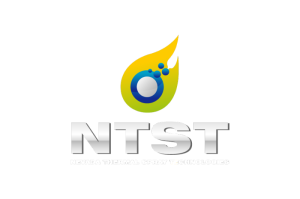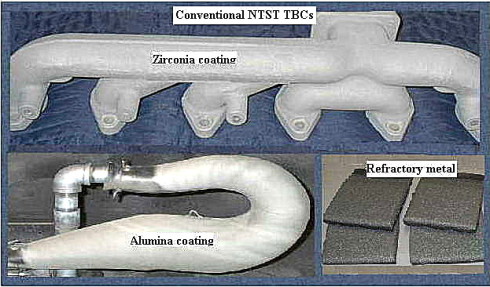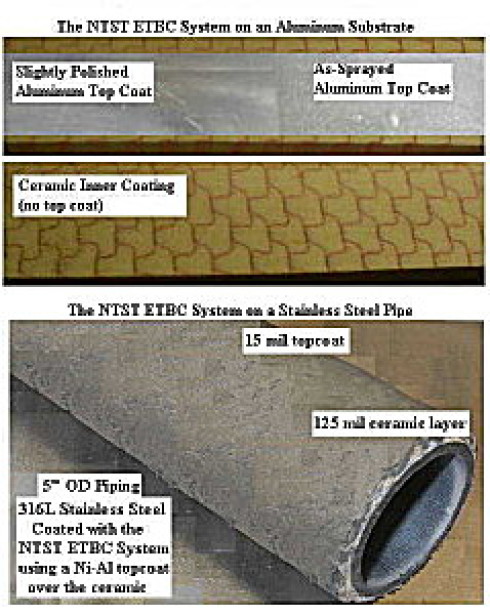
Latest NTST News:
New Hi-Tech Coatings:
Aluminum Nitride (AlN)
Boron Carbide (B4C)
Cubic Boron Nitride (c-BN)
Hex Boron Nitride (h-BN)
Chromium Nitride (CrN)
Fire Prevention
Porcelain
Silicon Carbide (SiC)
Silicon Nitride (Si3N4)
Tantalum Nitride (TaN)
Thermal Protection Systems Titanium Diboride (TiB2)
Titanium Nitride (TiN)
Zirconium Nitride (ZrN)
Download product bulletins at the "DOWNLOADABLE BROCHURES" section to the right >>>>>>
Download the "New NTST Coatings" Brochure for a short description of our newest products.
Need more technical information?
Click on the PRODUCTS tab above
Contact Information
call:
702-449-2154 Dominic
702-978-0151 Ron Kostick
email:
dominic@nevadathermalspray.com
or click for:
Nevada Thermal Spray Tech.
4842 Judson Avenue, Suite 115
Las Vegas, NV 89115
Thermal spray coatings are
used in over 50 industries
NTST Thermal Barrier Coatings
Plasma sprayed thermal barrier coatings (TBCs) such as zirconia, alumina, and refractory materials shown in Figure 1 have seen widespread functional use as thermal barriers in many applications in the transportation, aerospace, mining, and aircraft industries because of their refractory nature and low thermal conductivity. These TBCs are used to increase performance and durability of engine components at elevated temperatures. The coatings have been used in the combustion sections of aircraft engines, marine gas turbines, and electric power turbines, and for piston caps, cylinder liners, and exhaust ports in diesel trucks, boats, and locomotives.
The TBC system consists of a metal bond coat and a ceramic top coat. The use of the ceramic top coat allows the substrate to be insulated allowing a higher operating temperature and extending the service life of the substrate. It is desirable to customize the microstructure of these coatings in order to maximize porosity, macrocracking, and microcracking. This microstucture minimizes the thermal conductivity of the matrix. The porosity and cracking also influence erosion and thermal cyclic lifetime behavior and are therefore important parameters to control.
Figure 1. Conventional TBCs
Engineered Thermal Barrier Coating System: ETBC
Well-engineered TBCs are of paramount importance to solve thermal management problems in industry. To enhance the usage of land-based machinery (e.g. turbines, pumps, heat exchangers, engines) in various applications (e.g. mining, power generation, aerospace, automotive, heavy equipment) operating conditions are continually being increased. TBCs are becoming more important to achieve high reliability in these various systems. However, conventional TBCs in service can experience mechanical and thermal stresses, erosion, and corrosion, which can deteriorate the coatings.
NTST has developed a novel engineered a thermal barrier coating (ETBC) system (i.e. Figure 2) that can meet the high temperature thermal management challenges of many industries. The NTST ETBC system combines excellent hardness, temperature resistance, durability, and corrosion protection. Depending on coating thickness and service temperature, differential temperatures (inside skin to outside skin) of up to 700 F have been attained.
Applications that combine heat challenges with high vibration, space constraints, and weight which demand materials with extremely low thermal conductivity, superior consistency, and excellent durability will find the NTST ETBC system the solution to the problem. The NTST engineered coating system may be applied to hot or cold surfaces around complex geometries on thermal-hydraulic machinery such as tanks, furnaces, equipment (e.g. pumps, heat exchangers), and walls.
Figure 2. NTST ETBC




